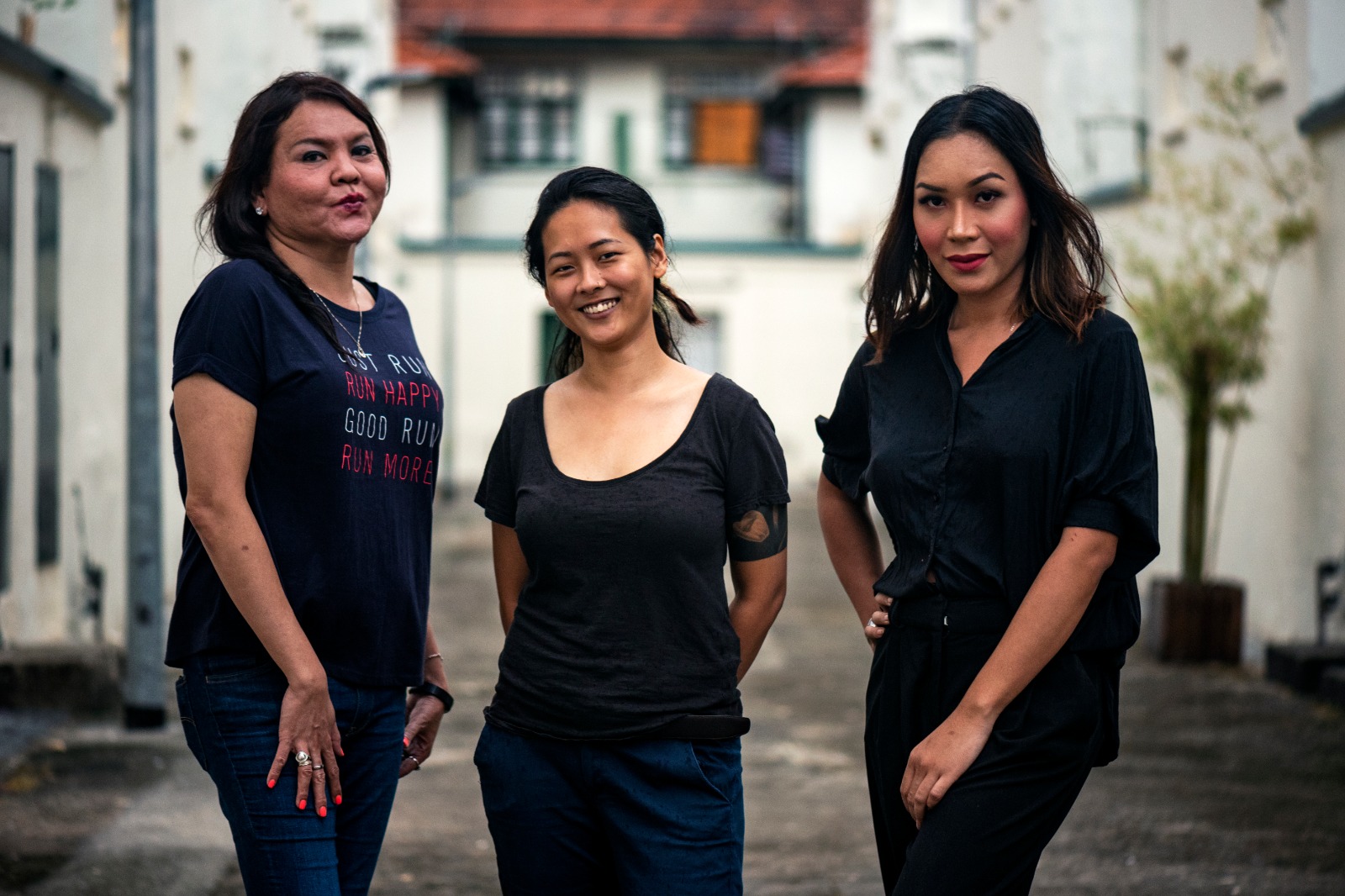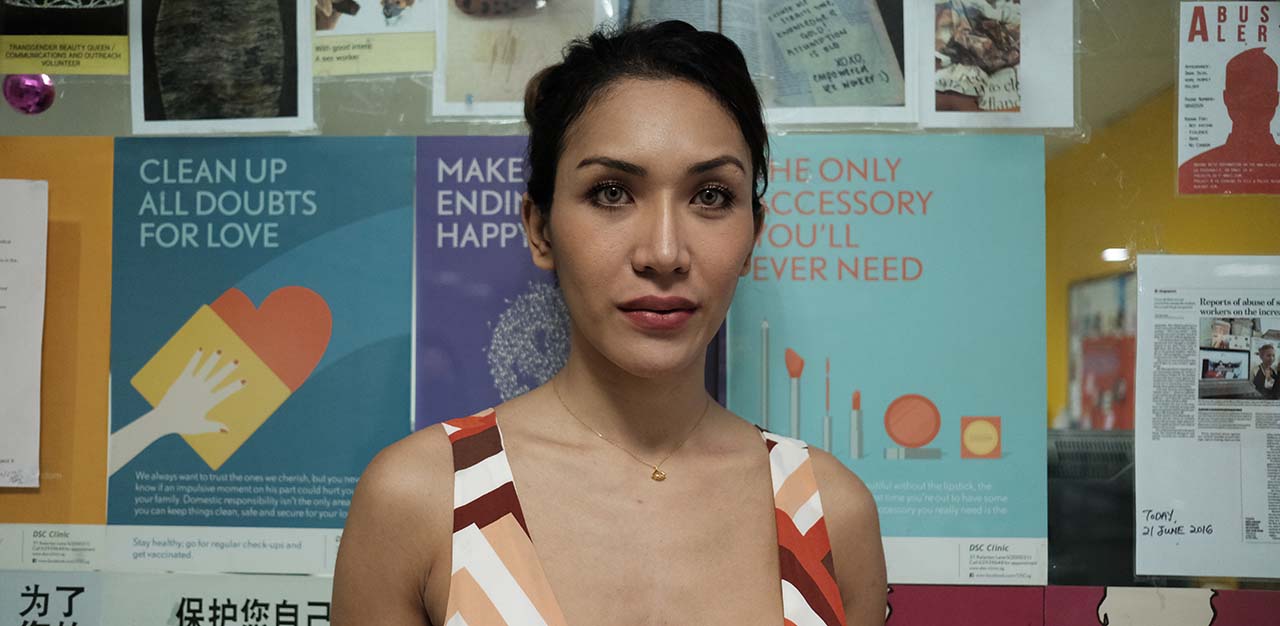Malay Muslim transgender activist and sex worker Sherry Sherqueshaa is no stranger to discrimination, having been a human rights advocate for the past seven years. Since 2014, Sherry has worked at Project X, a non-profit organisation addressing the social, emotional and health needs of people in the sex work industry. She has helped to coordinate community events, document human rights issues, attend regional conferences, and conduct community outreach to sex workers.
NOTE: This interview has been edited for clarity and length.
Sherry Sherqueshaa: I’m 30 and I transitioned about 10 years ago, at the age of about 20. Now, life and sex work is more or less where I find my own definition of a woman, and my identity as a trans woman.
TheHomeGround: I understand that you’ve been working with Project X for a long time. How has your work contributed to furthering gender equality?
SS: For me, the discussion, information and resources [available] on gender and sexuality are very important. International Women’s Day and milestones such as Transgender Rights Day or Sex Workers Day always got me thinking about what I did for the year. Not comparing, but noting the difference between the year and the year before that. So this year marks the 10th year since I transitioned.
So I see where I started, and I will say that what I’ve learned about gender equality, about the definition of trans women and sexuality, is by myself. I am comfortable saying that I didn’t have any resources to reach out to back then. Ever since, I put it upon myself to take this as a responsibility, or a duty, to provide answers for others, be it those who want to transition or to be an ally.
READ: International Women’s Day: Single Motherhood A Chance to Turn Her Life Around
THG: In line with 2021’s theme for International Women’s Day, #ChoosetoChallenge, what is one norm, social belief, stereotype or misconception that you’d like to challenge?
SS: In the early years of my transitioning, and doing sex work and also doing advocacy work, I would have the answer at the back of my mind. Back then, I noticed all the discrimination, stereotypes, and misconceptions that I encountered and experienced.
Now, I don’t necessarily take notice of discrimination, even though it might still be happening. I don’t notice anymore what people around me, who were, say, walking with me in the mall might notice, such as a guy taking a second look even though he’s walked past me already. These are the kind of stereotypes and misconceptions that people and society have towards trans women. They could be wondering why she is dressed the way she is, be it whether she’s overdressed or underdressed, or what she is doing in an area like Geylang. This is a misconception – thinking that all female or trans people are sex workers.
I wouldn’t say that there’s any specific norm or misconception I want to change right now. But if there’s anything that people say [that’s inaccurate] I want to challenge [it]. Or if I think that they need to know what’s on the other side of the world. People have to know the real inside story for them to strike a balance between the misconceptions, beliefs, and facts. So that’s something I would challenge – if one fully believes what they see or hear, that doesn’t come from the person himself, then I would challenge that person to listen up.
THG: You mentioned that people would sometimes give you a second look. Do you ever feel discriminated against because of being transgender?
SS: Overall, yes, but it all comes back to what I’ve learned. In the early years when I wanted to transition, I held societal beliefs and norms in mind – such as the expectation that a woman should be putting on a dress, putting on makeup, looking feminine, looking elegant and all that.
But as the years go by, as I’ve been transitioning, doing sex work, and living my life as a woman, I distance [myself] from what I imagine myself to be as a trans woman [based on stereotypes]. Because no matter how feminine I look, or whether I pass a standard or profile that society expects of women, I still won’t be treated as one, because people don’t want to date me.
That’s why I stopped taking notice if people take a second look at me or anything. Because I know that shows that even if I dress neatly, if people want to look at me or discriminate in any way or have anything against me they will despite me still living up to their standards of a woman, or their belief of what a woman should be.
READ: International Women’s Day: Queer, Proud and Unstoppable

THG: What are some changes you hope to see for women in Singapore?
SS: Maybe one change that is crucial and important would be to practise consciousness and respect, especially towards any marginalised community that is not within the norm, instead of openly or maybe obliviously taking a second look towards a certain type of person, [be it a] trans woman, trans man, or even people with disabilities.
The simplest thing one can do is to start to respect the community and the people in it, without any doubts. I think respect is the simplest thing that anyone can do. And that’s something that should have started a long time ago, without anyone, or even myself, preaching hard for it.
THG: Yes – respect is a basic human right, and it’s a shame that it’s not practised everywhere.
SS: I mean, that shows that this is a personal thing. It is not about certain groups or factors. Some examples that are brought up are age and race – some might say that people from a certain age group or race would practise less respect, but no, it is always about the individuals who are not practising respect towards one another.
READ: International Women’s Day: Abused but Unbeaten
THG: How do you hope to work towards gender equality?
SS: I’ve been doing advocacy work for seven years now, I believe. Of course, I do have hopes and dreams. I aim high. To do this, to do that, to achieve this, to make it a safer environment, to tell the whole world what I’ve gone through what I aim to achieve for youth and things like that.
I realised that I can’t be the only one doing it. Because I’ve been doing it, and we’re talking about talking in front of cameras, putting on our face, and telling our stories. Not many people are ready, or have the privilege, chance, or position that allows them to be open about who they are and their image. Some might still be uncomfortable going public, or may have a fear of being disowned by their family members or anything you say [might result in] any outcome or change that can’t be undone. As for me, my family knows about what I do for Project X and for sex work, and so do my friends. Literally everybody knows, so I have no hindrances or challenges that prevent me from speaking about it. Over the years, I’ve been helping the community and also preaching about the community to society.
THG: How have volunteer efforts been affected by COVID-19?
SS: If there’s one silver lining from the pandemic, it’s that it brought on more funding and donations. It’s also led to more concern and offers of help by people and current volunteers, or those who want to volunteer with us.
In the first few months, we weren’t sure what things were going to be like. A few months later, we got used to the new normal and figured out the groups and the community that were going to be impacted badly. These [extend beyond] those who work in the sex work industry to people who work in more normal settings, such as bars, entertainment clubs, and karaoke lounges – places that were told to close.
Circuit Breaker Phase 1 [Singapore’s lockdown] wiped out all the street-based sex workers in Geylang, Little India and in similar areas, because everyone was told to stay home. Going out, and even going to clients’ houses was a big risk – one that nobody was willing to take. And if we couldn’t do that, then we weren’t making any money. People who have been offering money or a helping hand are concerned because they know that these women are stuck with no choice, until something better comes along.
The pandemic has led to good and bad effects. If not for it, I wouldn’t be challenged with Project X, through handling and learning new things, because this whole situation is new to everyone.
My team and I learn as we go, especially with all the numerous funding coming in, and with people wanting to volunteer, knowing that we cannot meet up. We improvise and find ways to make things happen while looking in our own space. We work together to brainstorm how we can help sex workers, because some of them don’t really know what to do next. Some would probably just wait for the news, if they have ways to hear the news. Even if they understand what the news is saying, what I’ve observed during the pandemic is that not everyone knows that they’re entitled to certain grants, or how to get cash payouts, if not for us explaining the process to them. This includes advice on matters such as what they should do if they don’t have a bank account. We [act as] a bridge to bring all this information to them, so that they can get what they are entitled to.
Join the conversations on THG’s Facebook and Instagram, and get the latest updates via Telegram.




























